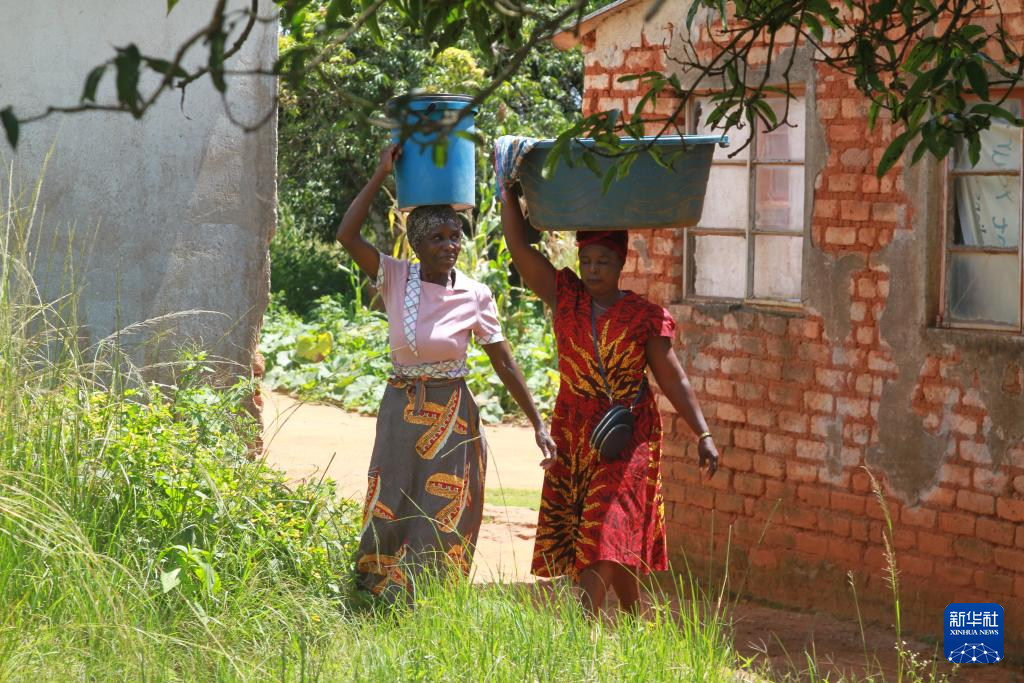Harare, March 23 (Xinhua) — “Chinese wells” bring hope to Zimbabwean farmers
Corn stalks are strung on straw as tall as a person, and sheep graze on the green grass on both sides of the narrow road. The women were laughing and lifting buckets of water above their heads, walking home with joy on their faces… This is the scene that the reporter saw during a recent visit to Chilinda Village in East Mashonaland Province, Zimbabwe.
 On March 20th, two women walked with water containers on their heads in the eastern province of Mashonaland, Zimbabwe. Xinhua News Agency (Photo by Tafra Mugala)
On March 20th, two women walked with water containers on their heads in the eastern province of Mashonaland, Zimbabwe. Xinhua News Agency (Photo by Tafra Mugala)
Last year, Zimbabwe suffered a severe drought. In response to drought, China has decided to assist in the construction of 300 water wells for the central province of Zimbabwe, as well as the eastern provinces of Manicalan, Masvingo, and East Mashonaland. Qilinda Village has already used the first batch of water wells built with Chinese aid, and recently held a handover ceremony.
There are rare large-scale events in the village, and everyone rushes to attend early in the morning. Some villagers even dance excitedly by the grass bushes. For a while, the small village gained a lot of festive atmosphere.
After the ceremony, the reporter walked into the home of 55 year old villager Mutangadula, who was busy watering the sweet sorghum in the yard. Upon learning that the reporter had come for an interview, she excitedly said, “Look at my sweet sorghum and corn that have already matured. This new well has really helped us a lot
There are a total of 55 households in Qilinda Village, and many families have settled here for generations. As with most rural areas in Zimbabwe, there are no other industries in the village, and villagers make a living by farming and raising livestock. Therefore, sufficient water sources are crucial for the livelihood of the entire village. In the words of the villagers, ‘Here, water is our life!’
For many years, Qilinda Village has shared a water well with two neighboring villages. But the well is far away from the village, and it takes two hours for villagers to walk back and forth to fetch water. What is even more distressing for them is that in recent years, Zimbabwe has suffered frequent droughts, causing wells to gradually dry up and the water they produce to become increasingly turbid, sometimes even unable to produce water.
In the past, women used to fight over water at the wellhead! “Mutangadula said as he peeled the sweet sorghum from his hands.
The well water is very turbid and needs to be boiled for a long time before we dare to drink it. Especially last year when there was a severe drought, there was almost no water in the well, making it impossible to irrigate crops and feed livestock, which greatly affected our lives, “said 73 year old villager Muzuka.
Muzuka told reporters that including his father, their family has been living here for over 100 years. In recent years, due to poor crop yields and difficult living conditions in the village, several children have moved to big cities such as Harare and Bravayo in search of job opportunities, leaving only the elderly couple struggling to make ends meet here. At the end of last year, the water well assisted by China was built at the village entrance, solving the water problem and giving them hope for a better life.
“The water from the well is very clear, and we don’t have to worry about water anymore. I want to thank the Chinese, you are Zimbabwe’s forever friends!” he said with emotion.
‘Thank you’ is the word that reporters hear the most from these simple villagers. After the celebration ceremony on that day, many villagers still stayed in front of the wellhead for a long time and refused to leave. They repeatedly said ‘thank you’ to the reporter’s camera.
When the reporter left, Mutangadula insisted that the reporter bring a sweet sorghum that she had just cut down to taste. She said, “We will guard the well and remember that the Chinese helped us build it!”
